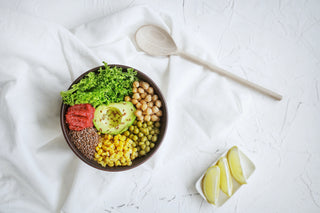In today's health-conscious world, there is a growing trend of marketing certain foods and supplements as immune system boosters. We often come across claims about specific diets and foods that supposedly enhance our body's defence against illnesses. However, it's crucial to separate fact from fiction when it comes to improving our immune system's functionality.
While there is no evidence to support the notion of "boosting" the immune system with remedies or specific foods, we can still focus on maintaining a healthy immune system to support overall well-being.

The foundation of a strong immune system lies in a balanced diet, regular physical activity, and good sleep hygiene. While there is no universally "best" diet for immune system health, there are certain guidelines we can follow. One key aspect is avoiding processed foods, especially those high in salt, sugar, and fat. Instead, we can experiment with spices and herbs like paprika powder, turmeric powder, and fresh garden herbs to add flavour to our meals without relying on excessive salt.
In addition to a healthy diet and lifestyle, certain supplements may support immune health. It's important to note that supplements should not replace a balanced diet but rather complement it. Here are a few supplements that have been studied for their potential immune-boosting properties:
-
Vitamin C: This essential vitamin is known for its role in immune function. While it may not prevent or cure illnesses, adequate vitamin C intake is important for overall immune health. Citrus fruits, berries, and leafy green vegetables are natural sources of vitamin C.
-
Zinc: Zinc plays a crucial role in immune system function. It helps with the development and activity of immune cells. Good dietary sources of zinc include lean meats, poultry, legumes, nuts, and seeds.
-
Probiotics: These beneficial bacteria promote a healthy gut microbiome, which is closely linked to immune function. Probiotics can be found in fermented foods like yogurt, sauerkraut, and kimchi.
-
Elderberry: Elderberry has gained popularity for its potential immune-supporting properties. It contains antioxidants and may help reduce the duration and severity of cold and flu symptoms. However, it's important to note that more research is needed to fully understand its effects on immune health.
-
Vitamin D: Vitamin D is essential for maintaining strong bones, but it also plays a role in immune function. While research is ongoing, low levels of vitamin D have been associated with an increased risk of respiratory infections. Natural sources of vitamin D include fatty fish, fortified dairy products, and sunlight exposure.
In conclusion, the idea of "boosting" the immune system with specific remedies or foods remains unsupported by scientific evidence. However, by adopting a healthy lifestyle that includes a balanced diet, regular exercise, adequate sleep, and appropriate supplementation, such as vitamin C, zinc, probiotics, elderberry, and vitamin D, we can support our immune system and overall well-being. Remember, there are no shortcuts or magic solutions when it comes to immune health—consistency and healthy habits are key.

